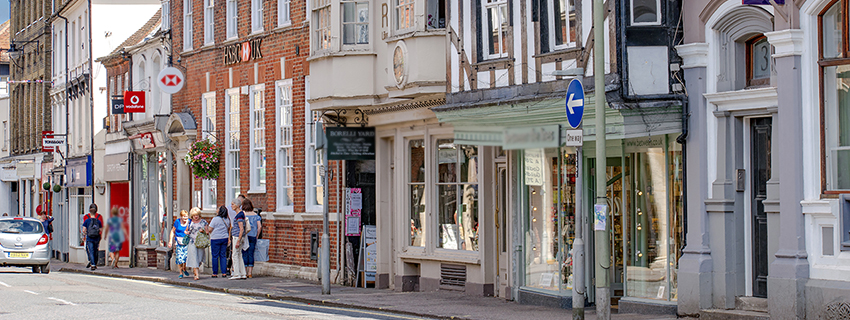
The New Victorians
The Future of Retail
Part 3: The New Victorians
HOWARD SAUNDERS, RETAIL FUTURIST
Have you caught sight of your reflection in the shop window lately, longing to be recognised by your local baker or butcher? Perhaps you’ve found yourself dropping your fishmonger’s name into the conversation as if to confirm you’re a loyal and enthusiastic regular. Maybe you’ve been spotted nodding long and respectfully to the passing postman or smiling enthusiastically at the supermarket checkout girl. If so, you have joined the millions of us who have awoken from lockdown to rediscover our long lost community spirit. Dickens would be chuffed.
We've have had to learn a whole new language too. Simple greetings and acknowledgments are far from empty etiquette. Nods are the affirmation of respect for another's role in society. The double eyebrow raise is the mutual understanding that says 'the world may have gone crazy, but we're still breathing air'. Over the last eighteen months, masks have helped choreograph a billion eyebrow ballets across the world as we were forced to express ourselves from behind the ubiquitous face nappy. And using names, well, that's another whole level of respect entirely and a very, very precious local currency indeed. Sometimes, pre-Covid hubris would occasionally brag of its detachment from the community, like a badge of the indefatigable elites who barely have time to take their eyes off their spreadsheets. Lockdown certainly taught us some valuable lessons.
Cities have had it easy. They've basked in their own neon limelight for the best part of a century. Every go-getting teen dreams of leaving home for the bright lights of the city, but there are signs that might be changing. The centre of the universe may well be shifting away from the glare of our urban centres and toward the places where we actually live. For home is where the WFH revolution began and where it's been busy recruiting a burgeoning hybrid army ever since. Lockdown forced us to go local, and funnily enough, most of us enjoyed it.
So much of the future lies tucked away quietly and courteously in the past. Our town centres will soon shake off their reviled 'clone-town' status and slowly but surely rebuild their individual personalities. The butcher, the baker and the ice cream maker will be in their element. And a renaissance of independent entrepreneurs waits eagerly in the wings to join them, with locally sourced products to replace the global stuff we were force fed for fifty years. Rest assured that fresh young blood is pumped and primed to bring us trendy bars, delis, and healthier takeaways and restaurants than ever before. Low rents and short leases will kickstart a faster changing, more dynamic retail landscape. Yes, the revitalisation of our towns will be spearheaded by food and hospitality.
But our attitudes to consumerism have shifted dramatically in the post Covid world. The delis, the bars and the takeaways will be punctuated by stores that salve our ever growing guilty consciences: second hand, up-cycled and refurbished goods will plug the gaps left abandoned by brands that lost faith in our towns. Not scruffy shops stuffed with dusty tat, but smart, branded places where throwaway culture is reversed and repurposed for a new age.
In our most enlightened towns an era of collaboration will emerge where stores and stalls share spaces and cross fertilise their wares. When a cafe collaborates with a neighbouring florist both brands benefit, but more importantly, the street itself comes alive.
A handful of brave national brands, that closed their doors in 2020, will venture back to the provinces in a bid to win over the customers they thought they'd lost for good. These new incarnations will be smaller than the ones they shuttered, but smarter too with fresh ideas and a distinctly local focus. The days of the token town's-name-on-the-fascia will be a quaint but distant memory.
But best news of all, some of our luckiest towns will cheer as they watch their concrete carbuncle of a shopping centre demolished to make way for a glorious, glazed Victorian style market hall, full of independent traders of fresh produce alongside bustling eateries noisy enough to compete with Barcelona's most cacophonous. Please don't dismiss this revival of the golden age of retail as a pipe dream. The demand for a more sustainable economy means the shift towards localism is already irreversible. As local produce strips naked to claim zero waste status, the imported stuff will diplomatically follow suit. Within ten years your milk may well be lab-grown but it will come in a traditional, recyclable glass bottle.
So, in many ways a snapshot of your high street in 2030 might look remarkably similar to one taken at the turn of the last century on an old bellows camera: a canopied avenue concertinaed together in a jolly attle for attention. Cookiecutter stores, that were simply a lacklustre version of their big city cousins, will have completely evaporated, along with mobile phone stores and banks. Back illuminated perspex fascias will be long banished. In the summer months, tables and chairs will spill from the restaurants onto the pavements as a much-loved memento of another important lesson from 2021.
But what you can't see in this photograph from the future is perhaps the most important lockdown lesson of all: the invisible, interlacing grid that connects everything with everything else. The consumer of the Twenties wants to check stock levels online, reserve items online, try things in store, pick up in store, have things delivered at a specific time, return them in store, pay via the mobile, read reviews, give feedback and receive after-sales advice both in store and online. In other words we want, and expect, a completely seamless experience that extends from our tiny screens to the store and back, for absolutely everything.
No matter what toys Apple and Samsung have planned for us, the mobile, demanding, entitled, forensic consumer is here to stay. Let's call them the New Victorians!